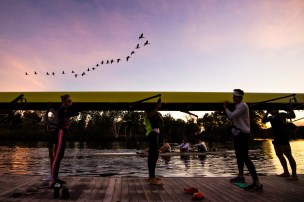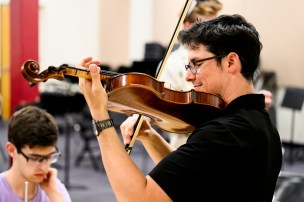Published on
Special ops training and WhatsApp: How Northeastern’s Global Safety team keeps Huskies out of danger
A group of savvy global security experts springs into action to help Northeastern students and faculty in emergencies abroad. But the bigger goal is to keep them out of trouble in the first place.
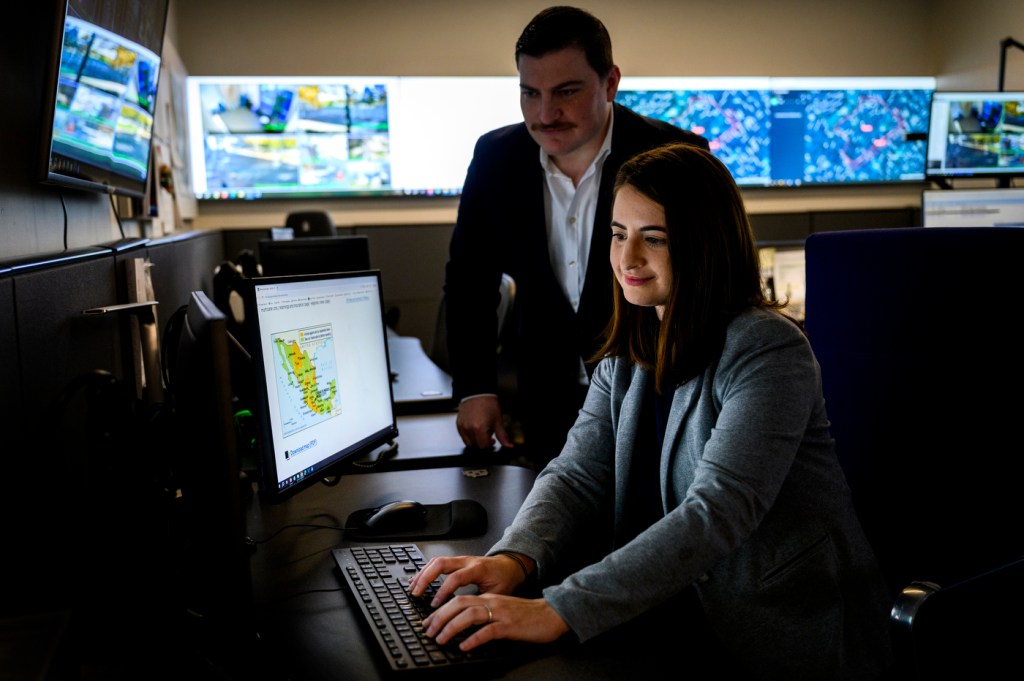
When news of the Hamas attack on Israel reached Marshfield, Massachusetts, around 3 a.m. on Oct. 7, Alyssa Berg was already awake.
“I have a toddler,” explains Berg, the associate director of travel safety and security for Northeastern University. Her phone started buzzing with alerts from Crisis 24, a London-based security and surveillance firm Northeastern works with to watch for major incidents around its global network. “We very quickly realized this needed our immediate attention,” she says.
At the same time, Crisis 24 had rustled awake Khushal Safi, Berg’s boss and Northeastern’s director of global safety, at his home in Rhode Island. The two raced through a database of registered students, faculty and staff traveling abroad, identifying and contacting three students on the ground in Israel. Two, Jesse Ruigomez and Keren Doherty, were on co-op in Tel-Aviv; another, Joshua Einhorn, was visiting family in Jerusalem.
Quickly, Doherty got a personal message from Safi over WhatsApp making sure she was safe and offering whatever help he could give. “I asked what he recommended doing because at this point, I wasn’t sure what was going on,” says Doherty, a fourth-year nursing student. “Should I flee the country, should I stay and wait it out?”
Shortly, they decided to evacuate. Safi helped Ruigomez and Doherty (who had family visiting) book flights to Portugal and Madrid and arranged a security detail to the airport. Berg made sure Einhorn, who was only in town for a short stay while studying abroad in Greece, left as planned. Everyone was out of Israel the next day.
Green and red dots
Northeastern had a several-hours head start in responding to the upheaval — Crisis 24 had eyes on the university network while most other U.S.-based institutions were off the clock. “That really paid off for us, having that service, because a lot of other organizations didn’t find out about it until the next morning,” Berg says. At the office’s emergency operations center on the Boston campus, all Northeastern travelers — thousands at any given time — are plotted on an electronic world map represented by tiny green, yellow, and red dots. The red dots are travelers in areas considered to be the highest risk; for the foreseeable future, travel in and around Israel will be a blazing red endeavor.
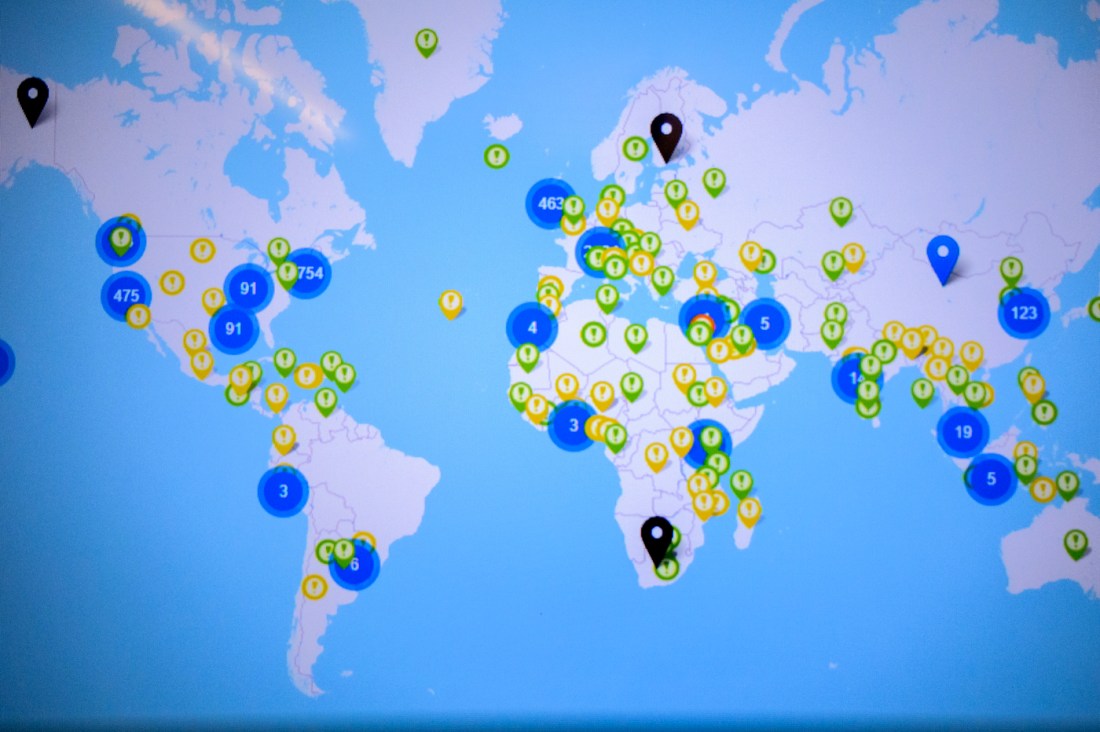
“Safi and his team are phenomenal,” says Amy Stevens, Northeastern’s vice chancellor of global experiential pathways. “I don’t know of another institution with a group of this caliber doing this kind of work. If a student is having a health emergency in Thessaloniki, they know the doctors, they know the hospitals to call.”
It’s been a busy few months of overseas emergencies for the Global Safety Office, whose full-time staff consists of Safi, Berg and JJ Cappa, an international safety and security specialist. In addition to the events in Israel, the trio have helped co-op students navigate the aftermath of a disastrous earthquake in Marrakesh, Morocco, and extracted a professor from a military coup in Niger. Whenever a major crisis breaks, from the wildfires in Maui to the sudden Category 5 landfall of Hurricane Otis on Mexico’s Pacific coast, there are usually students who need accounting for — even if, as in those two cases, they are ultimately unaffected.
“We are truly a 24/7 office,” says Berg. “We support all university travel, so we get calls at all hours of the day.”
But those dramatic rescues represent a fraction of the team’s purview, which has expanded in scope with the university itself. Mostly, they are concerned with prevention and strategy — making sure members of the Northeastern community are fully prepared, briefed and supported before they travel. That includes registering all university travel and meeting with students going abroad, but also building and maintaining partnerships and contacts overseas — with security firms, medical providers and even individual drivers and fixers who know the lay of the land in high-risk areas.
If you want to work in global education, learning and safety, there’s pretty much no better place.
JJ Cappa, international safety & security specialist for Northeastern University
In addition to students on co-ops and studying abroad, there are brick-and-mortar campuses in the U.S., London and Canada, with different security factors and logistical challenges for each. That means constant mobility for the student body — and a lot more movement for the team to stay on top of. “Our students pour across the world,” Safi says. “The growth is just mind-blowing.”
To keep up, the Global Safety Office is about to get an expansive upgrade. On Nov. 14, the team opened a global operations center on the Boston campus, where a larger, 24/7 team can monitor all university travel and security in one place. Before long, Safi says, that will include unifying all surveillance and security procedures for the 13 global campuses under one umbrella.
“There’s a way to create uniformity,” Safi says. “You’ll walk into [any] Northeastern space, all of your access protocols will look the same. The goal is to have a one-badge system, so you can take off [from Boston] and boom, walk into Oakland, if you have a reason to be there.”
Ultimately, Safi, Berg and Cappa want to build an operation that makes them industry leaders not just in higher education, but for all large organizations operating across the world — to rival the connectivity and systems put in place by retail giants like Target and financial firms like Sanofi.
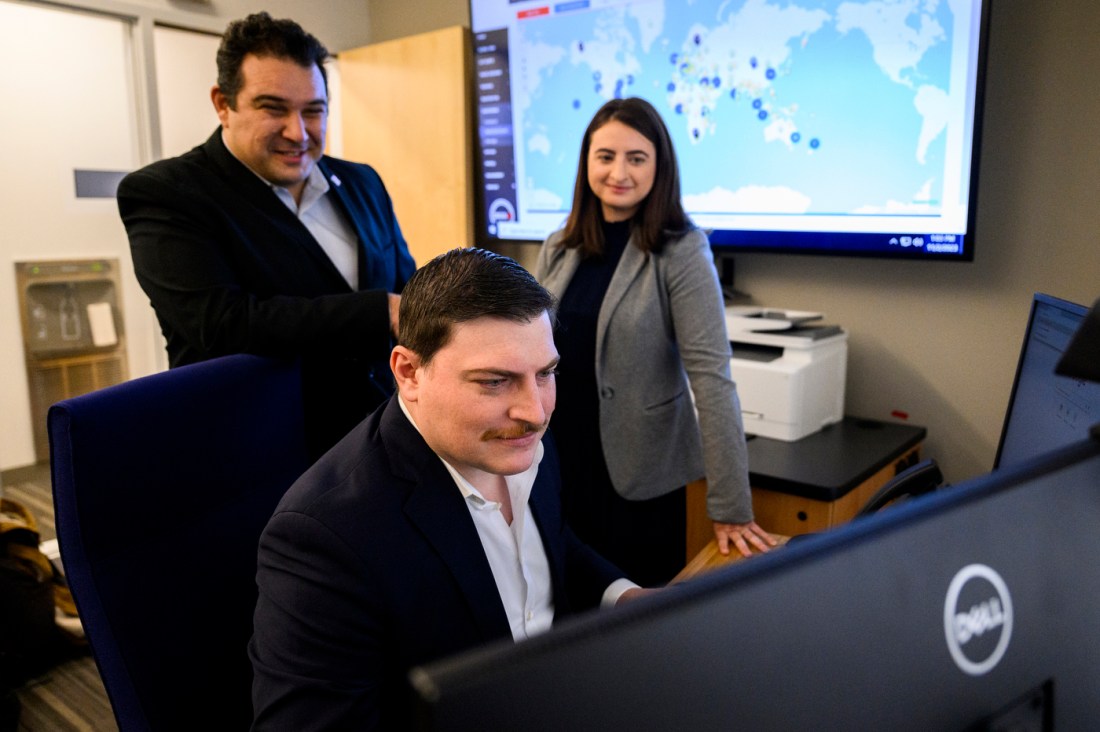
“If you want to work in global education, learning and safety, there’s pretty much no better place,” says Cappa, who joined Northeastern in 2019. “It’s so central to the mission.”
In addition to its other duties, the team makes regular visits around the global campus network, never missing a detail when it comes to safety. “When we go to meet [campus] partners, they will tell us, ‘Oh, Safi made us put this fire extinguisher here and add another security camera over here,’” Stevens says. “It’s down to the individual residences.”
‘Our students pour across the world’
Safi joined Northeastern after a decade working in counterintelligence for private security firms in Washington, D.C. When Berg joined him and his handful of student workers in 2015 (past co-ops have gone on to work at the U.S. State Department) they served more of a consulting role for other campus departments for specific travel questions.
The Global Safety Office was created to support the growing global footprint of the university with new campuses, experiential learning programs, and research trips taking students, faculty and staff to multiple locations around the world. “As the university was growing, there was much more need for hands-on management of the resources and support that we were providing our travelers,” Berg says.
Emergency response is in Berg’s blood; her father is a retired Boston firefighter. Earlier in her career, she worked as an analyst in the supply chain field, watching for domestic and global disruptions that could impact business operations for large financial firms. With Safi, she began coordinating emergency responses overseas and using Northeastern’s already-robust network of co-op and study abroad partnerships to build out the office’s reach overseas. They also began working with the Global Experience Office and other university departments to expand pre-departure trainings, consultations on Dialogue of Civilizations trips and overseas co-op placements, and a registry of all university travel.
All travel has inherent risk. You could have a perfectly safe and bubbled experience in a dangerous country. But you could be in a destination that’s not on the high-risk list and decide to go bungee jumping.
JJ Cappa, international safety & security specialist for Northeastern University
Students and faculty traveling to high-risk areas have to answer a questionnaire outlining their housing, transportation plans and understanding of their destination. They also meet one on one with Cappa, who manages most of those pre-travel preparations. Before arriving at Northeastern, Cappa taught English in Japan and worked as a risk specialist for insurance giant AIG. With all of his acute training in the things that can go wrong in travel, he occasionally looks back at his own vacation history with a mild retroactive panic.
“In college I went to Costa Rica on a family trip, and it certainly wasn’t the most dangerous place I’ve ever been, but there were some risks that were … not well mitigated,” he chuckles. “We got off the plane and immediately my parents passed the bags off to a random person. We got in a prop plane, flew across the country and landed in a grass field, then got into a van my dad’s cousin sent and drove at breakneck speeds on a dirt road sized for one vehicle. I look back on that trip, doing what I do now, and think, ‘I wouldn’t be able to allow this.’”
Especially for high-risk destinations, he says, petitioning the university is a useful exercise for students and faculty to fully realize what they’re getting into. “It’s where they start to gain a bit of expertise into what the risks are, and we can share our experience to make sure they go abroad with the tools to have a safe and healthy semester.”
In October, he was in the middle of reading through more than 100 applications for summer 2024 group travel — from weeklong MBA program site visits to month-long Dialogue of Civilizations trips. “New programs are invented here all the time, and we try to make sure they are resilient to disruptions.”
In Israel, for example — considered a “fairly safe location” before Oct. 7 — students were equipped with a list of bomb shelters nearby and emergency response apps to have at the ready. All university-sponsored travelers are also required to have a cellphone that can make emergency calls independently of Wi-Fi. The team generally contacts students in emergency situations through WhatsApp, which has a vast global usership and can be accessed on both cellular and Wi-Fi networks.
Risk is relative
Those basic steps all ensure the Global Safety Office can reach travelers no matter what precipitates their emergency. The “what” has evolved over the past decade or so. Berg joined Northeastern the week before the November 2015 terrorist attacks in Paris, and at the time, terrorist activity was top of mind for those working in global risk assessment. That all changed with COVID-19, which, in addition to requiring an endless, herculean effort by the team to get students out of Asia, then Europe, then the rest of the world before the cascade of border closures in 2020, shined a brighter spotlight on the importance of health care accessibility writ large.
“I think 85 to 90% of the support that we provide is from a medical or wellbeing perspective,” Berg says. “We work very closely with different offices on campus, like the Disability Resource Center and Health and Counseling Services [HCS] to help students that may be traveling with preexisting health conditions or with medications.”
The rise of extremism across the world in recent years presents another challenge, and one that can affect the safety of some students more than others. “We take a stance that if there’s any level of risk to any members of our community, we’ll rate that country at a higher risk. So if you’re an LGBTQ traveler, and we know that there’s a concern around you being in that country based upon your status, then we’re going to rate that country as high risk for everybody,” Safi says.
But it’s a prevalent example of how risk for no two travelers is alike. It’s why the Global Safety Office places a premium on meeting every individual where they are, helping them make the best possible decisions, and being ready to help them at a moment’s notice.
“All travel has inherent risk,” Cappa says. “You could have a perfectly safe and bubbled experience in a dangerous country. Look at all the different places President Biden has visited — he’s been to Ukraine, he’s been to Israel. These are both at war. But you could be in a destination that’s not on the high-risk list and decide to go bungee jumping.”
“Everybody’s threshold is different,” he adds. “We’ve had students in Europe concerned about the residual impacts of the war in the Ukraine and decide to leave programs early. And we have students who would happily do a co-op in an active war zone. We try to provide information so that people can make informed decisions.”
That’s not to say they don’t give their input — strongly when needed. Before a recent afternoon packed with top-level strategy meetings, Safi was off to dissuade an unnamed professor abroad from going paragliding.
Schuyler Velasco is a Northeastern Global News Magazine senior writer. Email her at s.velasco@northeastern.edu. Follow her on X/Twitter @Schuyler_V.



